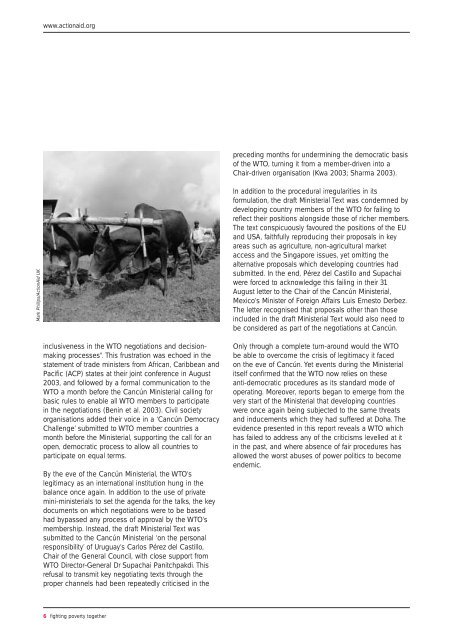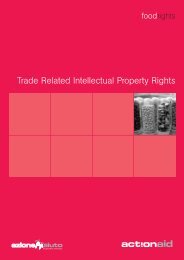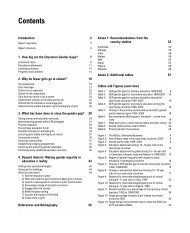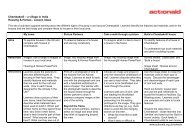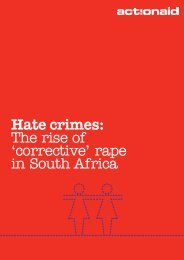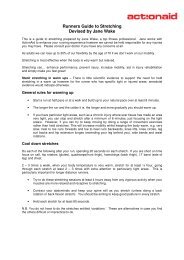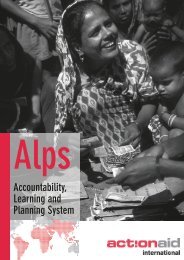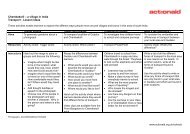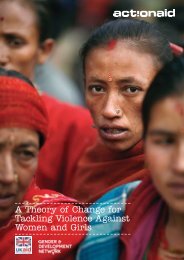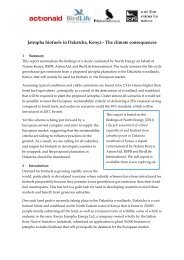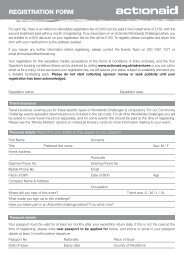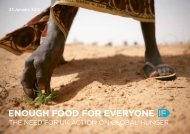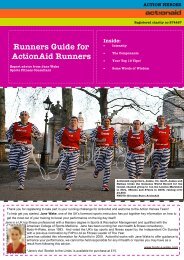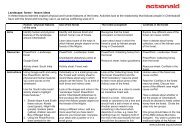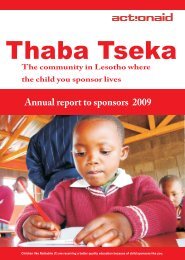Divide and Rule: - ActionAid
Divide and Rule: - ActionAid
Divide and Rule: - ActionAid
You also want an ePaper? Increase the reach of your titles
YUMPU automatically turns print PDFs into web optimized ePapers that Google loves.
www.actionaid.orgpreceding months for undermining the democratic basisof the WTO, turning it from a member-driven into aChair-driven organisation (Kwa 2003; Sharma 2003).Mark Phillips/<strong>ActionAid</strong> UKIn addition to the procedural irregularities in itsformulation, the draft Ministerial Text was condemned bydeveloping country members of the WTO for failing toreflect their positions alongside those of richer members.The text conspicuously favoured the positions of the EU<strong>and</strong> USA, faithfully reproducing their proposals in keyareas such as agriculture, non-agricultural marketaccess <strong>and</strong> the Singapore issues, yet omitting thealternative proposals which developing countries hadsubmitted. In the end, Pérez del Castillo <strong>and</strong> Supachaiwere forced to acknowledge this failing in their 31August letter to the Chair of the Cancún Ministerial,Mexico’s Minister of Foreign Affairs Luis Ernesto Derbez.The letter recognised that proposals other than thoseincluded in the draft Ministerial Text would also need tobe considered as part of the negotiations at Cancún.inclusiveness in the WTO negotiations <strong>and</strong> decisionmakingprocesses”. This frustration was echoed in thestatement of trade ministers from African, Caribbean <strong>and</strong>Pacific (ACP) states at their joint conference in August2003, <strong>and</strong> followed by a formal communication to theWTO a month before the Cancún Ministerial calling forbasic rules to enable all WTO members to participatein the negotiations (Benin et al. 2003). Civil societyorganisations added their voice in a ‘Cancún DemocracyChallenge’ submitted to WTO member countries amonth before the Ministerial, supporting the call for anopen, democratic process to allow all countries toparticipate on equal terms.By the eve of the Cancún Ministerial, the WTO’slegitimacy as an international institution hung in thebalance once again. In addition to the use of privatemini-ministerials to set the agenda for the talks, the keydocuments on which negotiations were to be basedhad bypassed any process of approval by the WTO’smembership. Instead, the draft Ministerial Text wassubmitted to the Cancún Ministerial ‘on the personalresponsibility’ of Uruguay’s Carlos Pérez del Castillo,Chair of the General Council, with close support fromWTO Director-General Dr Supachai Panitchpakdi. Thisrefusal to transmit key negotiating texts through theproper channels had been repeatedly criticised in theOnly through a complete turn-around would the WTObe able to overcome the crisis of legitimacy it facedon the eve of Cancún. Yet events during the Ministerialitself confirmed that the WTO now relies on theseanti-democratic procedures as its st<strong>and</strong>ard mode ofoperating. Moreover, reports began to emerge from thevery start of the Ministerial that developing countrieswere once again being subjected to the same threats<strong>and</strong> inducements which they had suffered at Doha. Theevidence presented in this report reveals a WTO whichhas failed to address any of the criticisms levelled at itin the past, <strong>and</strong> where absence of fair procedures hasallowed the worst abuses of power politics to becomeendemic.6 fighting poverty together


